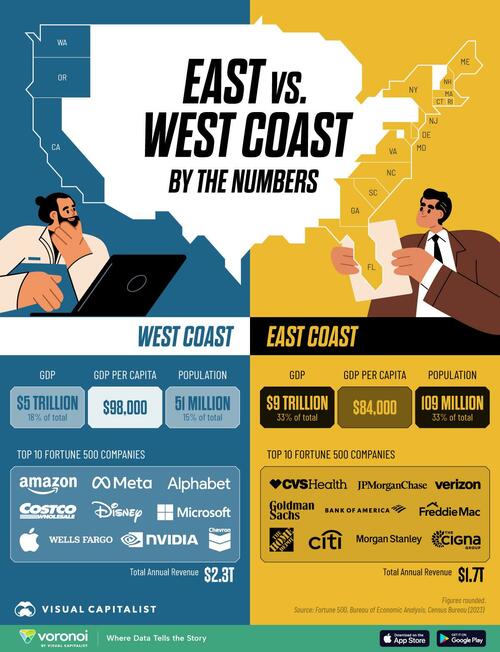America’s East and West Coasts together contribute about half of the country’s $27 trillion GDP. For context, these two regions are home to 17 states and 160 million people.
But how do they stack up against each other?
In this map, Visual Capitalist's Pallavi Rao takes a look at which states constitute both coasts and also measure their combined economic productivity.
Data is sourced from the Bureau of Economic Analysis and the Census Bureau, as of 2023.
So, Which Coast is the Best Coast?
The Eastern Seaboard, where a third of Americans live, has a combined GDP of $9 trillion, also about a third of the U.S. economy.
Note: All figures rounded.
On the other hand, the West (figures listed below) comes in at about $5 trillion. And despite the smaller overall number, it’s punching above its weight, with less than half the population. This is better seen in how the GDP per capita shakes out for both: $98,000 for the West versus $84,000 for the East.
California leads the way for its coast, with its economy nearing $4 trillion, just by itself.
Note: All figures rounded.
Of course, the East has the pedigree, the history, and the people. It’s where the original 13 states declared independence in 1776 after all. On the other hand, California joined the union in 1850, followed by Oregon (1859) and Washington (1889).
But even before Silicon Valley changed California (and the West, and perhaps the world?), the Golden State has been central to America’s economic growth.
California King
The gold rush set off the largest inter-state migration in U.S. history and fueled wild dreams. After it ended, agriculture became California’s largest sector, followed by oil at the start of the 20th century. In fact, as recently as 2012, California was the third-largest oil producing state.
All of that has now been eclipsed now by California’s booming tech sector, home to four trillion-dollar companies—Alphabet, Apple, Meta, and Nvidia. Further noth, Washington has another two: Amazon and Microsoft.
In stark contrast, the East Coast has none, though it is home to several finance giants: JPMorgan Chase, Goldman Sachs, Citi, Bank of America, and Morgan Stanley.
Looking for more comparison graphics? Take a look at How State Economies Compare to Entire Countries where five U.S. states could replace countries in the top 20 by GDP.
America’s East and West Coasts together contribute about half of the country’s $27 trillion GDP. For context, these two regions are home to 17 states and 160 million people.
But how do they stack up against each other?
In this map, Visual Capitalist's Pallavi Rao takes a look at which states constitute both coasts and also measure their combined economic productivity.
Data is sourced from the Bureau of Economic Analysis and the Census Bureau, as of 2023.
So, Which Coast is the Best Coast?
The Eastern Seaboard, where a third of Americans live, has a combined GDP of $9 trillion, also about a third of the U.S. economy.
Note: All figures rounded.
On the other hand, the West (figures listed below) comes in at about $5 trillion. And despite the smaller overall number, it’s punching above its weight, with less than half the population. This is better seen in how the GDP per capita shakes out for both: $98,000 for the West versus $84,000 for the East.
California leads the way for its coast, with its economy nearing $4 trillion, just by itself.
Note: All figures rounded.
Of course, the East has the pedigree, the history, and the people. It’s where the original 13 states declared independence in 1776 after all. On the other hand, California joined the union in 1850, followed by Oregon (1859) and Washington (1889).
But even before Silicon Valley changed California (and the West, and perhaps the world?), the Golden State has been central to America’s economic growth.
California King
The gold rush set off the largest inter-state migration in U.S. history and fueled wild dreams. After it ended, agriculture became California’s largest sector, followed by oil at the start of the 20th century. In fact, as recently as 2012, California was the third-largest oil producing state.
All of that has now been eclipsed now by California’s booming tech sector, home to four trillion-dollar companies—Alphabet, Apple, Meta, and Nvidia. Further noth, Washington has another two: Amazon and Microsoft.
In stark contrast, the East Coast has none, though it is home to several finance giants: JPMorgan Chase, Goldman Sachs, Citi, Bank of America, and Morgan Stanley.
Looking for more comparison graphics? Take a look at How State Economies Compare to Entire Countries where five U.S. states could replace countries in the top 20 by GDP.



